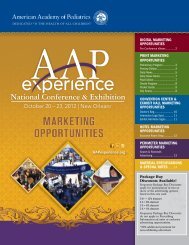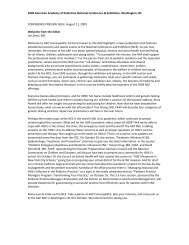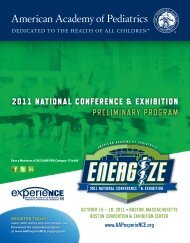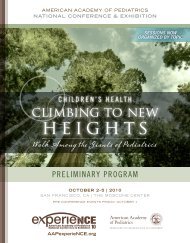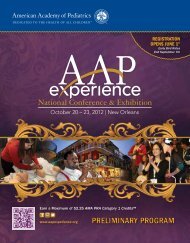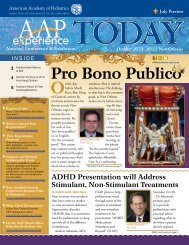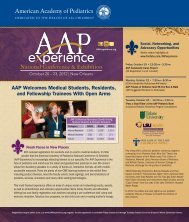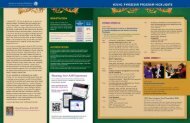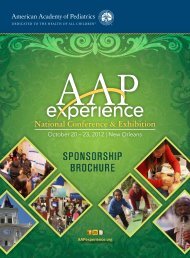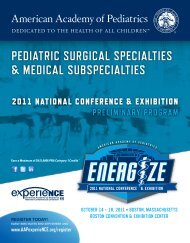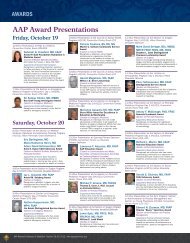Plenary Sessions - American Academy of Pediatrics National ...
Plenary Sessions - American Academy of Pediatrics National ...
Plenary Sessions - American Academy of Pediatrics National ...
Create successful ePaper yourself
Turn your PDF publications into a flip-book with our unique Google optimized e-Paper software.
PLENARY SESSIONS<br />
» SATURDAY, OCTOBER 15<br />
10:30 am – 12:15 pm<br />
BCEC, Ballroom<br />
P1081 President’s Address<br />
O. Marion Burton, MD, FAAP<br />
P1082 Education Award<br />
Recipient: Beverly P. Wood, MD, MSEd, PhD, FAAP<br />
Presenter: Robert A. Wiebe, MD, FACEP, FAAP<br />
P1083 T Keynote Address: Creating a Culture <strong>of</strong><br />
Compassion—A Bird’s-Eye View<br />
Caroll Spinney<br />
Sesame Street has always been about social values as much<br />
as it has been about learning the alphabet, and it has been<br />
recognized as a very positive part <strong>of</strong> <strong>American</strong> culture. Big<br />
Bird, as portrayed by Caroll Spinney, teaches many life lessons<br />
through this humble but larger than life character recognizable<br />
the world over. The same attitudes required, and <strong>of</strong>ten modeled,<br />
by health care pr<strong>of</strong>essionals must be instilled in children in order<br />
to develop the attitudes necessary to live happy and productive<br />
lives: compassion, self-confidence, persistence, imagination, tolerance,<br />
curiosity, openness, respect, and humor, to name a few.<br />
P1084 T Bariatric Surgery: What Do I Tell My<br />
Patients?<br />
Thomas Inge, MD, PhD, FAAP<br />
This session will provide descriptions <strong>of</strong> bariatric procedures<br />
and concepts in adolescent development important to consider<br />
in selection, preparation, and follow-up <strong>of</strong> bariatric surgery.<br />
Comorbidities that lead to bariatric surgery will be reviewed.<br />
Individual psychological and families issues will be reviewed.<br />
Special issues in nutrition and exercise will be addressed.<br />
P1085 Minimally Invasive Robotic Surgery: The<br />
Future Is Now!<br />
Hiep Nguyen, MD, FAAP<br />
This session will provide an overview <strong>of</strong> the current and future<br />
use <strong>of</strong> minimally invasive robotic surgery and how it is already<br />
revolutionizing the perioperative care <strong>of</strong> children. This is a<br />
cutting-edge topic by an internationally recognized leader in minimally<br />
invasive robotic surgery.<br />
» SUNDAY, OCTOBER 16<br />
10:30 am – 12:15 pm<br />
BCEC, Ballroom<br />
P2071 Health Care Reform: Where Are We?<br />
What Now?<br />
Jay Berkelhamer, MD, FAAP<br />
Now that health reform has been the law for over a year, what<br />
has changed? And what further changes will come as a result <strong>of</strong><br />
the most recent elections? This informative session will review<br />
the current status <strong>of</strong> health reform implementation for children<br />
and describe future opportunities for advocacy by pediatricians<br />
and families.<br />
➤ ➤ (Attend session X4010 for expanded topic coverage.)<br />
P2072 The Science <strong>of</strong> Early Childhood<br />
Development: A New Frontier in Pediatric Research<br />
and Practice<br />
Jack Shonk<strong>of</strong>f, MD, FAAP<br />
This session will provide an overview <strong>of</strong> the work done by the<br />
<strong>National</strong> Scientific Council on the Developing Child, which highlights<br />
the evidence on the impact <strong>of</strong> early adverse experiences/<br />
toxic stress on vulnerable children and policy implications with<br />
regard to efficacy and cost.<br />
P2073 Preventing Sudden Unexpected Infant<br />
Deaths: Lessons Learned in Promoting Safe Sleep<br />
Erich Batra, MD, FAAP<br />
The Back to Sleep campaign in the 1990s had a significant effect<br />
on infant mortality rates in the United States and across the world.<br />
Since then, improved death scene investigations have led to a better<br />
understanding about the risk factors surrounding unexpected<br />
infant deaths during sleep. This session will examine how lessons<br />
learned over the last 20 years can assist pediatricians in discussing<br />
safe sleep practices with parents.<br />
P2074 Hand<strong>of</strong>f or Handshake—Transitioning Youth<br />
to Adult Providers With the New Health Care<br />
Transitions Algorithm<br />
Jimmy Stewart, MD, FAAP<br />
With reasonable biological and psychological certainty, most adolescents<br />
eventually transition to adulthood. There is much less<br />
certainty about the manner in which pediatricians support this<br />
transition, particularly for children with special health care needs<br />
(CSHCN). This session will review the new clinical report that<br />
provides explicit, implementable guidance to the medical home<br />
using an algorithmic format addressing activities during <strong>of</strong>fice visits<br />
between 12 and 18 years <strong>of</strong> age. The clinical report addresses<br />
transition planning for all adolescents, but also provides a generic,<br />
but detailed pathway for CSHCN.<br />
➤ ➤ (Attend session I2051 for expanded topic coverage.)<br />
P2075 The ABCs <strong>of</strong> ACOs: Making Them Work for<br />
<strong>Pediatrics</strong><br />
Colleen Kraft, MD, FAAP<br />
This session will present an overview <strong>of</strong> accountable care organizations<br />
(ACOs) and their possible impact on pediatrics. It will<br />
focus on identifying major challenges and opportunities these<br />
new models <strong>of</strong> care will present as they sprout in private and<br />
public arenas.<br />
➤ ➤ (Attend session S2103 for expanded topic coverage.)<br />
28 AAP <strong>National</strong> Conference & Exhibition // Boston, MA BCEC = Boston Convention and Exhibition Center Indicates focused content for subspecialists
$$<br />
B Blended Learning Tickets Required Obesity Track<br />
October 15–18, 2011 \\ www.AAPexperience.org 29<br />
PLENARY SESSIONS<br />
» MONDAY, OCTOBER 17<br />
10:30 am – 12:15 pm<br />
BCEC, Ballroom<br />
P3061 Improving Children’s Health Care<br />
Donald M. Berwick, MD, MPP<br />
» TUESDAY, OCTOBER 18<br />
10:30 am – 12:15 pm<br />
BCEC, Ballroom<br />
P4051 Christopherson Lecture—Tobacco and<br />
Children: A Global Epidemic<br />
Douglas Bettcher, MD, MPH, PhD<br />
The Affordable Care Act <strong>of</strong>fers opportunities to both increase<br />
access and improve children’s health care. Dr Berwick will<br />
discuss the Centers for Medicare and Medicaid Services<br />
efforts to expand Medicaid and implement the health<br />
insurance exchanges.<br />
This session will describe the global tobacco epidemic and<br />
its threat to the health <strong>of</strong> children and adolescents. It will<br />
describe the WHO FCTC, a legally binding international treaty<br />
that <strong>of</strong>fers the tools to address this epidemic, including<br />
potential for partnership with civil society. This presentation will<br />
P3062 Biologic Medications in Rheumatologic<br />
<strong>of</strong>fer concrete suggestions on how pr<strong>of</strong>essional and advocacy<br />
Diseases: What’s the Latest<br />
paediatric associations can make a difference in the tobacco<br />
epidemic and in the future <strong>of</strong> millions <strong>of</strong> children worldwide.<br />
Christy Sandborg, MD<br />
The array <strong>of</strong> currently available biologic agents will be described<br />
and reviewed in the context <strong>of</strong> their indications. The mode <strong>of</strong><br />
action will be used as the basis for their use as well as their<br />
P4052 Human Trafficking: The Fastest-Growing<br />
Criminal Industry Worldwide<br />
Reena Isaac, MD, FAAP<br />
potential benefits and risks. Potential adverse effects will be<br />
discussed as a means <strong>of</strong> providing the participants the skills to<br />
adequately assist in the care <strong>of</strong> these children. The participants<br />
will be provided with scenarios for the use <strong>of</strong> these agents so<br />
they may better be able to assist families in deciding whether to<br />
use these agents for their child.<br />
Human trafficking is the fastest-growing criminal industry in the<br />
world. Unlike sub-Saharan African nations, where children may<br />
be sold by family members out <strong>of</strong> desperation, traffickers in the<br />
United States target “throwaways.” The purpose <strong>of</strong> this session<br />
is to broaden knowledge about this topic, enlist advocates to<br />
help address at-risk children, and to help develop partnerships<br />
P3063 Personalized Medicine and the $1,000<br />
with existing community/national/international organizations.<br />
Genome<br />
Bruce Korf, MD, FAAP<br />
P4053 What Do I Need to Know About Children’s<br />
Mental Health?: Competencies for Pediatric<br />
The knowledge gained from the Human Genome Project has<br />
led to the promise <strong>of</strong> “personalized medicine.” This session will<br />
Primary Care<br />
Benjamin Siegel, MD, FAAP<br />
prepare pediatricians to answer their patients’ questions regarding<br />
new possibilities, including direct-to-consumer marketing <strong>of</strong><br />
testing for individual genetic variation, pharmacogenomic applications,<br />
and even the so-called “$1,000 individual genome.”<br />
This session will review the mental health competencies for<br />
pediatric primary care, their rationale, and their potential use by<br />
practicing pediatricians and pediatric training programs to build<br />
knowledge and skills in the area <strong>of</strong> children’s mental health.<br />
P3064 CFTR-Related Metabolic Syndrome—An<br />
Unintended Consequence <strong>of</strong> Newborn Screening<br />
Michael Schechter, MD, MPH, FAAP<br />
P4054 Immunizations: At What Cost? A Primary<br />
Care Perspective<br />
Richard Oken, MD, FAAP<br />
This session will review the increasing complexity <strong>of</strong> the diagnosis<br />
and management <strong>of</strong> infants with cystic fibrosis (CF) and its<br />
newly recognized variants, infants who carry CF mutations that<br />
do not cause classic CF but may lead to some organ dysfunction<br />
over time.<br />
Vaccines are one <strong>of</strong> the greatest health care advances in pediatrics,<br />
but this achievement has come at great cost—both economic<br />
and emotional—to the physician. Despite overwhelming<br />
evidence <strong>of</strong> the efficacy and safety, doctors are refusing to give<br />
immunizations because they are losing money. This primary care<br />
P3065 Genes Meet the Environment—Epigenetics<br />
Robert Wright, MD, MPH, FAAP<br />
Epigenetics is the study <strong>of</strong> how genes are influenced by environmental<br />
factors in ways that turn them “on” or “<strong>of</strong>f.” This process<br />
determines what characteristics within the genetic code are activated.<br />
This session focuses on these concepts, which represent<br />
the interface between our genetic code and how this code can<br />
linchpin is coming undone despite the best efforts <strong>of</strong> the AAP<br />
to advocate for reasonable payment for both vaccine costs and<br />
administration services. To increase efficiency and to decrease<br />
errors, the AAP is leading the change in innovations, such as<br />
bar-coding, improved quality measures, and evidence-based<br />
research. Despite best efforts, the vocal opposition has challenged<br />
the validity and aggravated the cost <strong>of</strong> our efforts. Will<br />
they succeed in poisoning our progress?<br />
be influenced by factors in the environment.<br />
P4055 Clostridium Difficile Infections in Children:<br />
An Important Update<br />
Clifford McDonald, MD<br />
In parallel with increased infections and deaths in adults, there<br />
are reports <strong>of</strong> increasing rates <strong>of</strong> Clostridium difficile infection<br />
and severity in children. An overview <strong>of</strong> the epidemiology, diagnosis,<br />
and treatment <strong>of</strong> C. difficile in children will be provided with<br />
special emphasis on the role <strong>of</strong> newly emergent, hypervirulent<br />
strains and the diagnostic challenges posed by high rates <strong>of</strong><br />
colonization and uncertain disease susceptibility among infants.




